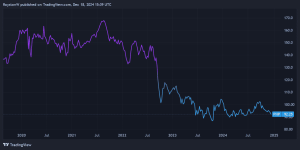U.S. stock-index futures were sharply lower early Tuesday, but off the worst levels overnight, when Russian President Vladimir Putin ordered the deployment of troops to separatist areas within Ukraine, after recognizing their independence, a move that some fear puts Ukraine and Russia one step closer to military conflict.
Markets in the U.S. were closed in observance of Presidents Day and trade on Tuesday will provide the first opportunity for investors to react to developments in Eastern Europe.
How are stock-index futures performing?
-
Dow Jones Industrial Average futures
YM00,
-0.59%
were trading 354 points, or 1.04%, lower to reach around 33,653. -
S&P 500 index futures
ES00,
-0.59%
were trading 55.25 points, or 1.27%, lower at about 4,288. -
Nasdaq-100 futures
NQ00,
-1.32%
were sinking by roughly 284 points, or 2.03%, to reach around 13,711.
On Friday, the Dow
DJIA,
dropped 232.85 points, or 0.7%, to close at 34,079.18; the S&P 500
SPX,
fell 31.39 points, or 0.7%, to end at 4,348.87; and the Nasdaq Composite
COMP,
declined 168.65 points, or 1.2%, to finish at 13,548.07. A so-called death cross crystallized in the Nasdaq, a bearish chart pattern.
For the week, the Dow booked a 1.9% slump, the S&P 500 fell 1.6% and the Nasdaq Composite ended down 1.8%, marking the second consecutive week of declines.
What’s driving the market?
Markets were set for big losses on Tuesday as Putin ordered forces Monday to “maintain peace” in separatist regions of eastern Ukraine. The announcement raised fears, which have kept investors skittish, that an invasion was about to materialize.
The White House said President Joe Biden will issue an executive order that “will prohibit new investment, trade, and financing by U.S. persons’’ in those areas.
Meanwhile, officials from the European Union referred to Putin’s latest moves, including the recognition of the independence of the Russian separatist Donetsk and Luhansk regions’ independence, as “a blatant violation of international law.”
“Most of the sell-off in global equities this year can be attributed to the hawkish shift by the world’s major central banks,” Neil Shearing, Group Chief Economist, at Capitol Economics, wrote in a note to clients early Tuesday. “This suggests that there is still significant downside for global stock markets (and upside for safe havens, including US Treasuries) if the conflict escalates.”
Markets have been unsettled at least partly due to concerns of a Russian annexation of Ukraine, which could lead to greater global tensions. Crude-oil futures and those for natural gas
NG00,
have been mostly buoyed by invasion fears, with West Texas Intermediate crude
CL.1,
CL00,
traded on the New York Mercantile Exchange, the U.S. benchmark contract, trading at a new seven year high early Tuesday.
Read more: Oil rises and natural gas surges 8% as Russia orders troops to Ukraine
This post was originally published on Market Watch







